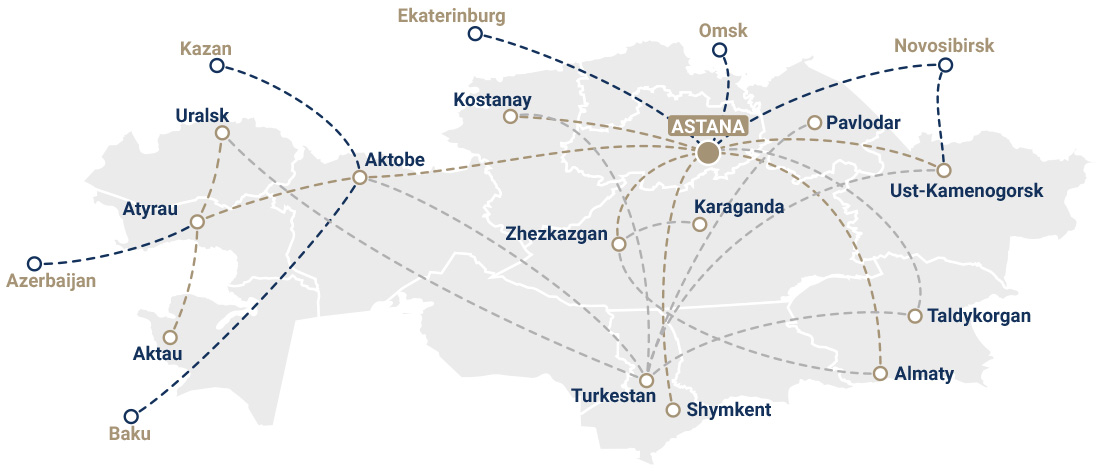Transport and logistics

Development of passenger transport
Founded in 2002, Air Astana JSC is the largest airline in Kazakhstan in terms of revenue and fleet size.

Key performance results
|
Indicator |
2021 |
2022 |
|
production indicators: |
||
|
passenger traffic, thousand people |
6618 |
7,349 |
|
cargo traffic volume, tonnes |
18 772 |
12 839 |
|
aircraft load factor, % |
80 |
83 |
|
on-time flight performance indicator, % |
82 |
74 |
|
financial indicators, KZT billion: |
||
|
revenue |
324.9 |
478 |
|
net profit |
15.5 |
37.6 |
|
operating profit |
43.6 |
70.1 |
|
taxes paid |
14.5 |
41.9 |
Market Overview
Being one of the largest airlines in Eurasia by income and fleet size, Air Astana JSC Group has 71% and 42% market share on domestic and international routes from Kazakhstan, respectively. In 2022, Air Astana JSC group transported more than 7.3 million passengers on more than 51 thousand flights covering 88 routes in 20 countries. Despite the COVID-19 pandemic, the Air Astana group of companies has increased its fleet to 43 aircraft, the average age of which is 5 years.
The Air Astana JSC group operates under two brands: Air Astana, a full-service carrier, and FlyArystan, which is a budget carrier. Each of these brands of the Group is aimed at different customer markets and geographical regions, providing a choice according to a range of customer needs and travel goals.

FlyArystan is one of the first low-cost carriers, or LCC, in Eurasia6 and the largest domestic airline in Kazakhstan in terms of capacity and volume of traffic with a growing network of international routes. The company’s strategy is to adhere to the principles of the ultra-low cost model used in the USA and Europe, while Air Astana JSC remains a full-service option for travel within the country and abroad. The COVID-19 pandemic resulted in the stoppage of domestic air traffic in Kazakhstan in March 2020, but later that year it recovered and exceeded the volume of domestic passenger traffic in 2019. This permitted FlyArystan to take advantage of the growing domestic market and promote a new way of air transportation in the region.
FlyArystan renders low-cost air transportation services on regular short- and medium-haul routes through Kazakhstan and further to the Caucasus, Central Asia and the Middle East. The FlyArystan brand was established in May 2019 and by the end of 2022 operates 14 aircraft from five bases in Kazakhstan on 40 routes.
A strong financial position and a flexible approach to decision-making during difficult periods in the market permitted the Group to react quickly to the geopolitical events of 2022. During the year, the airline’s route network continued to expand due to the resumption of flights from Almaty to London, Almaty to Beijing and Atyrau to Istanbul, as well as the launch of new flights to the Greek island of Crete. Along with flights to Phuket in Thailand, the airline has started daily flights to Bangkok since November, which is an important step in the restoration of the Asian network. Frequencies to Dubai and Delhi have also been significantly increased.
Factors that Affected Results
Freight sales on domestic routes within Kazakhstan decreased slightly due to increase in the capacity of trucks between Almaty and Astana. The volume of Kazakhstan exports on international routes was negatively affected by the suspension of flights to Russia and Ukraine; those heading to China were also affected by the absence of freight charters from Almaty to Beijing.
The main factors that affected the indicator of timely flight performance in 2022, which resulted in its decrease are as follows:
- Almaty airport infrastructure: equipment problem and staff shortage;
- Shymkent airport infrastructure: security restrictions, very limited number of maintenance equipment and weather conditions;
- the closure of the Astana airport during the daytime due to construction work, which resulted in longer delays when the flight deviated from the schedule;
- the unstable political situation in the world, which forces us to quickly change the routes of most international flights, which leads to an increase in flight time and to a violation of the timely arrival / departure of flights;
- the airline industry is facing an extreme crisis, expressed by strikes and a shortage of resources, including human resources, at foreign airports;
- environmental factors (e.g. bird strike or damage by foreign objects);
- inability to provide spare parts by the manufacturer Pratt& Whitney due to global supply chain disruptions.
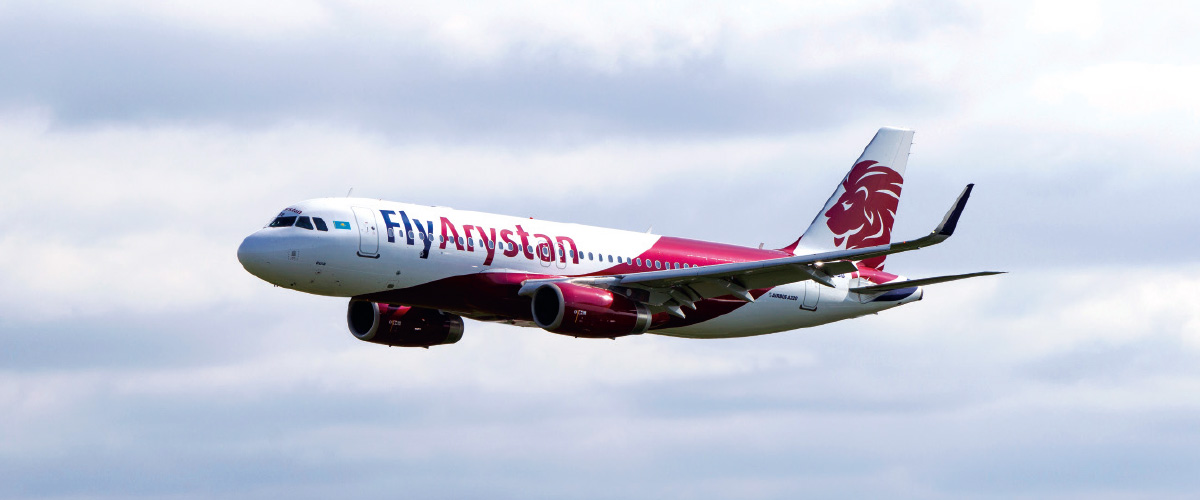
The above violations affect the duration of the flight crew’s duty.
To minimize the impact of the above, the following actions are performed:
- from July 20, 2022, aircraft are being introduced daily in case of unforeseen circumstances in order to avoid or minimize massive schedule disruptions and long delays;
- regular meetings with the management of Almaty Airport to improve the work of the Group and service at the airport;
- Air Astana JSC has officially appealed to all domestic airports with a request to inform in advance about all planned construction works for more accurate planning of the flight network;
- regular meetings with the Civil Aviation Committee and the Aviation Administration of Kazakhstan regarding Kazakhstan airports and the condition of equipment;
- the approach to crew planning has been changed due to the postponement of basic vacations and training for periods of low load.
Aircraft Fleet
In December 2022, Air Astana JSC received its 10th Airbus A321LR aircraft directly from the manufacturer. The Airbus A321LR is a long-haul version of the A321neo with a two-class layout: 16 seats in business class and 150 seats in economy. Airbus A321LR operates flights of the international Air Astana network to destinations such as Antalya, Bangkok, Dubai, Frankfurt, Istanbul, London, Phuket and Sharm el-Sheikh, as well as a new flight to Heraklion on the Greek island of Crete.
As of December 31, 2022, the Group operated 43 aircraft, including 35 Airbus A320/A321 family aircraft, three Boeing 767s and five Embraer E190-E2. 29 aircraft are operated by Air Astana JSC and 14 by FlyArystan in accordance with a single operator certificate owned by the Group. The average age of the Group fleet at the end of 2022 was 5 years, which makes it one of the youngest in the world.
By decommissioning the Boeing 757 and Embraer E190-E1 in 2020-2021, the Group will continue to implement its fleet simplification strategy aimed at reducing the aircraft family to two types. By the end of 2027, it is planned to increase the fleet to 64 aircraft.
Engineering and Technical Support
To ensure the highest level of aircraft safety, airworthiness and reliability of aircraft, the Department of Engineering and Technical Support (ETS) maintains the Group fleet of aircraft in accordance with the aircraft manufacturer’s maintenance program approved by the aviation regulator. ETS is one of the largest and most complex divisions of the airline, which employs more than 850 employees in 6 subdivisions.
High standards of maintenance of Air Astana are carried out in accordance with the rules of the European Aviation Safety Agency (EASA). The airline is an approved EASA Part 145 maintenance organization that is regularly examined by EASA to ensure compliance. The airline has EASA permits to perform aircraft maintenance at bases in Almaty and Astana, with linear stations in Atyrau, Shymkent and Aktau, which opened in 2021, there are also hangars for maintenance in Almaty and Astana. In addition, Air Astana JSC provides line maintenance services for external customers-airlines.

In 2022, the ETS Department continued to expand the project to organize its own maintenance and repair (M&R) in the form of C-check for the Airbus A320 family of aircraft, which provides significant cost savings in comparison with the M&R outsourcing scheme. In October 2022, Air Astana JSC became the first Kazakhstan carrier to perform comprehensive C2 level maintenance, which includes in-depth inspections and tests of each part of the aircraft, including non-destructive testing of the aircraft structure. At the end of 2022, the company has completed 14 C-checks, which has significantly reduced costs and at the same time increased engineering experience.
Training Academy
The Air Astana JSC Training Academy is an accredited aviation training center of the Aviation Administration of Kazakhstan (AAC), which also provides mandatory (regulatory) trainings to external clients.
In 2022, the development of instructors’ skills was focused on computer and e-learning, focusing both on new programs and on improving existing courses. To improve the employee experience and encourage a culture of self-learning, the Learning Management System (LMS) has been redesigned to make it more user-friendly. The LMS has launched a new personal development library with over 40 new courses/articles and videos to support individual personal development and training plans based on evaluation results, company values and core competencies.
The development of an on-the-job training program for engineering and ground services was also the key aspect to maintain continuous on-the-job training and the integration of new employees into their departments.
A full-fledged flight simulator will be installed at the base in Astana to support pilot training, which will be the first of its kind in Kazakhstan, which will be put into operation in April 2023. The simulator will be operated in accordance with EASA standards with the support of an EASA-approved flight simulator training organization and under the supervision of the EASA Aviation Administration. The operation of the flight simulator and the technical capabilities provided by Air Astana JSC will comply with EASA requirements. This will significantly expand the airline’s training capabilities as part of its planned future growth.

Booking System
The development of a new online booking mechanism (IBE) has significantly improved the quality of customer service and interaction with users. www.airastana.com remains the key source of international e-commerce in Kazakhstan, offering customers various convenient payment methods in addition to credit cards, such as using ApplePay or obtaining instant credit from the largest banks in Kazakhstan. Flexible self-service and registration options also attract customers online, rather than through portals run by global agents who require high costs for a global distribution system due to their overseas locations.
Innovations
A distinctive feature of any business aimed at success in the future is the emphasis on innovative processes and digitalization. In 2022, the Company continued to actively invest in the Company’s IT and e-business infrastructure, launching new products and implementing ongoing development projects in response to customer feedback, and to optimize and improve the efficiency and convenience of the entire travel process.
About 10000 passengers use self-service terminals every month. During 2022, Air Astana JSC took part in the EGOV ID project in cooperation with the aviation authorities and airports of Kazakhstan, allowing passengers to use e-ID for domestic flights, and this system is now fully operational at all airports in Kazakhstan. A Baggage Reconciliation System (BRS) has been implemented to avoid cases of improper handling of baggage.
Plans for 2023
- Development and restoration of regional routes by launching new destinations and increasing the frequency on existing routes;
- Expansion of the fleet due to the supply of new aircraft;
- Implementation of a number of new digital projects: biometric airport, which permits to perform all airport formalities faster and more efficiently; payment system at airports; interactive mobile boarding pass, integration of SCS (Station Control System) in Astana with the airport system (automation of services and billing); digital station files (paperless procedures);
- Increase in annual enrollment in the Ab-Initio Cadet program;
- Further expansion of heavy maintenance facilities in Astana by adding workshops for composite repair, airframe construction repair, repair and testing of emergency equipment, repair of on-board entertainment components and calibration of instruments;
- Meeting the maintenance needs of the expanding fleet by considering all aspects of the expansion of hangars in Almaty and Astana, human and technical resources, including training requirements;
- Increase in the indicator of timely execution of flights;
- Expansion of Almaty Airport in 2023-2024 will increase the capacity, as well as improve conditions for passengers;
- Presentation of a number of initiatives to improve passenger service on board;
- The transition to a more environmentally friendly approach, supported by the introduction of MyPress (digital content for passengers), which reduces the number of printed press.
- Expansion of the film and music library due to improved built-in monitors and a signed agreement with Disney;
- Getting ESG rating;
- Verification of the section on sustainable development in the Annual Report of the Group;
- Integration of the Sustainable Development Goals into the practice of AS reporting.
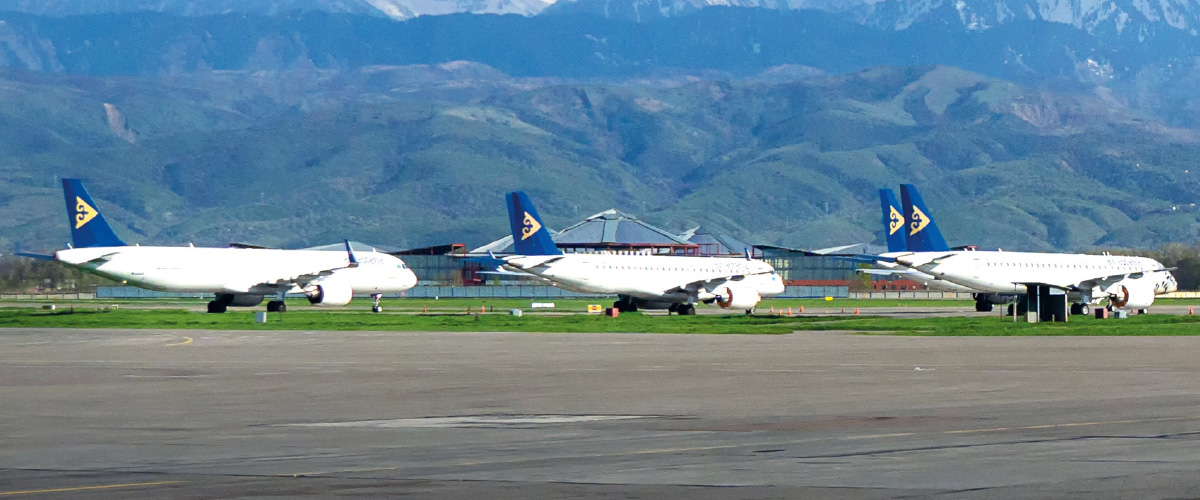

QAZAQ AIR JSC is the Kazakhstan airline established to improve the safety and accessibility of interregional air services in the Republic of Kazakhstan and the border areas of neighboring states. Annually confirming the IOSA certification and being an official member of IATA, the Airline brings a culture of international safety standards to regional air transportation. The airline was created specifically to operate on domestic airlines of Kazakhstan, as a response to the growing public demand for stable connections between regional centers.
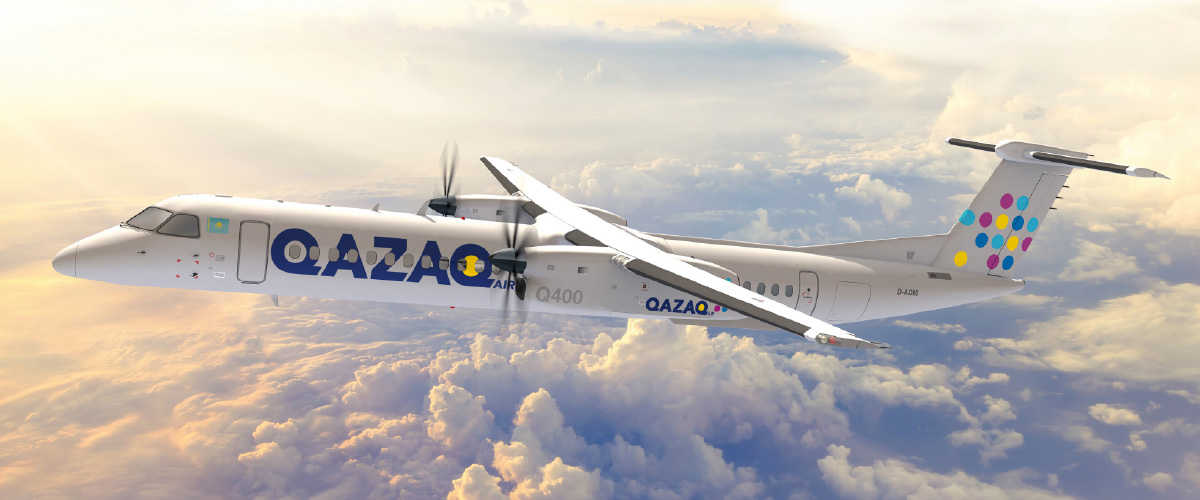
Key performance results
|
Indicator |
2021 |
2022 |
|
production indicators: |
||
|
passenger traffic, thousand people |
569.8 |
561 |
|
cargo traffic, tonnes |
50.2 |
32.1 |
|
aircraft load factor, % |
78 |
82 |
|
on-time flight performance indicator, % |
73 |
75.7 |
|
financial indicators, KZT billion: |
||
|
revenue |
12.8 |
20.4 |
|
net loss |
–6.5 |
–6.6 |
|
operating profit/loss |
–2.8 |
3.2 |
|
taxes paid |
0.8 |
0.8 |
Market Overview
The main strategic goal of the Airline is to establish internal regional routes for the development of air traffic, especially in those areas where there is an active demand, and there is no or insufficient supply on the market.
The airline contributes to economic development by connecting regions with affordable domestic flights to cities that are engines of growth, providing connections with international and longer routes from these cities.
In Kazakhstan, in the field of regional transportation, there are destinations that are not sufficiently covered by convenient and affordable air transportation. At the same time, the development of regional communication contributes to the disclosure of the social economic potential of the regions of Kazakhstan. Today, most of our passengers use unique routes that other airlines do not have. QAZAQ AIR JSC continues intensive work on the development of domestic air transportation and will work towards border routes in order to support the qualitative growth of the Kazakhstan economy and improve the standard of living of the population.
In 2022, the Airline entered the top three in the nomination “Best Regional Airlines of Central Asia and the CIS 2022” according to Skytrax. The high appreciation of the Airline’s work within the framework of the Skytrax award is proof of the commitment to high standards and recognition from passengers. High customer orientation, provision of reliable products and services at all stages of travel: from ticket purchase, on board and assistance in expedited passage of all airport check-in procedures.
Factors that Affected Results
The results of 2022 confirm the achievement of QAZAQ AIR JSC of the key results of the airline’s formation and contribution to the development of civil aviation in Kazakhstan.
In 2022, the Airline demonstrated 61% increase in income, including due to the expansion of the international flight program.
At the same time, it is necessary to identify a number of factors that influenced decrease in the indicator of timely flight performance in 2022:
- infrastructure of local airports: limited number of maintenance equipment and weather conditions; lack of aircraft parking to check engines and difficulties with their organization) and lack of personnel;
- unstable political situation in the world, which affected the number of traffic in 2022.
Launch of its own aviation training center
The airline’s first educational institution for the training of aviation personnel was successfully launched in 2022. In May, the training center received a certificate confirming its compliance and readiness to train aviation industry specialists. 23 flight attendants have already been trained and started working at the center. Also in 2022, 6 Kazakhstan's – co-pilots - became aircraft commanders.
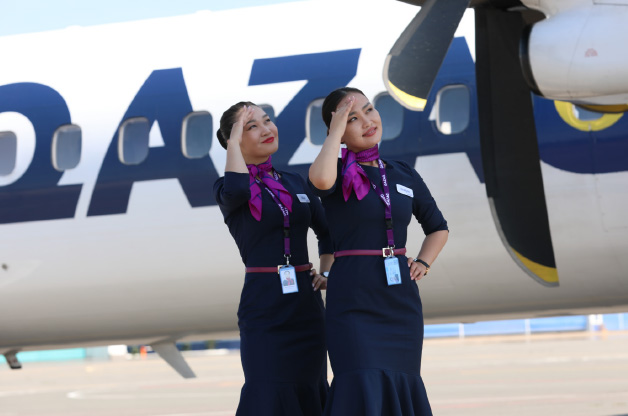
Route Network
In 2022, the airline launched international flights from Atyrau to Astrakhan and from Aktobe to Baku. Flights with the border million cities - Omsk, Novosibirsk, Kazan and Yekaterinburg began to be carried out on a regular basis.
The Airline’s regional route network includes popular, socially important routes subsidized by the state in the following directions: from Turkestan to Kostanai, Uralsk, Aktobe, from Almaty to Zhezkazgan, from Astana to Taldykorgan and Pavlodar, as well as from Zhezkazgan to Karaganda.
Compliance with the IOSA international industrial safety standard
In 2022, QAZAQ AIR JSC has once again successfully confirmed compliance with the international IOSA standard and is an official member of IATA. Accredited independent auditors checked the implementation of IOSA standards and recommended practices in all areas of the airline’s operational and production activities: organization and safety management system, flight operations, organizational support of flights and flight control support, aircraft engineering and technical support, actions of flight attendants and technical crew, ground handling, freight transportation and maintenance aviation security.
Safety Culture
The health and safety of employees determines the basis for the implementation of the company’s strategic goals. QAZAQ AIR JSC follows the indicators of industrial safety, reducing the risks of injuries and accidents by introducing a safety culture in all aspects of its activities. For 2022, the coefficient of injuries with loss of working time (LTIF) is 0, no accidents and incidents were registered during the period.
Toward the goal
QAZAQ AIR JSC fleet consists of five modern De Havilland Dash-8-Q400NG turboprop aircraft (formerly known as Bombardier Q400) of Canadian production. In order to increase passenger traffic and expand the route network, the company is working on the acquisition of a jet aircraft. Increased fleet will ensure competition in the air transportation market and will make it possible to fly longer distances. In 2023, it is planned to launch new international flights Astana - Chelyabinsk - Astana, Aktobe - Mineralnye Vody - Aktobe, as well as a new subsidized direction on the route Astana - Urjar - Astana.
